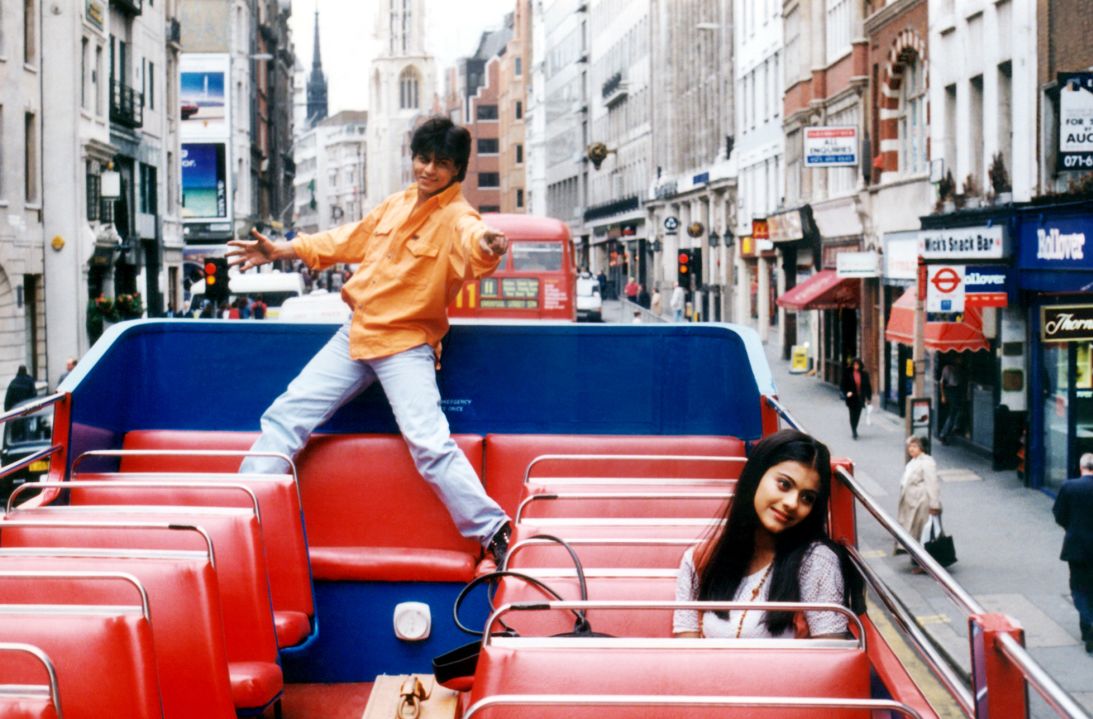Lifestyle
Bollywood Classic ‘DDLJ’ Celebrates 30 Years of Timeless Romance

Inside the Maratha Mandir movie theater in Mumbai, the atmosphere buzzes with excitement as the first notes of the iconic mandolin riff from “Diwale Dulhania Le Jayenge” fill the air. For nearly three decades, this film has captivated audiences, with daily showings drawing viewers eager to experience its tale of forbidden love. Released in 1995, “DDLJ” has become a cultural phenomenon, offering a familiar escape for many who flock to the cinema for less than $1 a ticket.
The story follows two young Indians, Raj Malhotra and Simran Singh, portrayed by Shah Rukh Khan and Kajol, respectively. The pair meet during a carefree trip across Europe, only to face the ultimate challenge of winning Simran’s father’s approval. The film’s blend of romance and cultural conflict resonated deeply with audiences, making it the second-highest-grossing film of its decade.
As the film celebrates its 30th anniversary, loyal fans like Suneel Shedge, a 50-year-old diamond worker, express their love for this enduring love story. “I watch it almost every day,” he says, often bursting into song. “Sometimes I cry, sometimes there’s pain. There’s happiness, there’s sadness. A movie like this will never be made again.”
This enduring appeal stems not just from its narrative but also from its cultural significance. The film mirrors India’s transformational journey in the early 1990s, as the nation opened up to globalization while grappling with its identity. Aditya Chopra, the film’s director and son of Bollywood legend Yash Chopra, crafted a story that encapsulated the aspirations and conflicts of his generation.
Emotional Resonance and Cultural Reflection
In “DDLJ,” Simran’s character embodies the struggle between familial duty and personal desire, a conflict that resonates with many young Indians today. Her father, Baldev Singh, initially arranges her marriage to another man, setting the stage for a dramatic narrative of rebellion and acceptance. The film culminates in a powerful scene where Baldev ultimately blesses Simran to pursue her own happiness, symbolizing a shift towards modern values.
The film’s score, composed by Jatin-Lalit, includes timeless songs that have become anthems of romance and celebration in India. The music contributes significantly to the film’s legacy, enhancing its emotional depth and connection with audiences.
Prominent Indian film critic Anupama Chopra attributes the film’s success to a unique combination of factors, stating, “You can’t attribute its success to just one single thing. When the cinema gods deem that you create a classic, the stars align.” This multifaceted appeal has influenced many subsequent Bollywood films, setting a new standard for romance in cinema.
A Lasting Legacy and Cultural Impact
“DDLJ” was groundbreaking for its portrayal of the Indian diaspora, presenting characters who navigate the complexities of love and cultural identity. Previously, Indians abroad were often depicted in negative roles. The film shifted this narrative, showcasing relatable struggles that resonate with both Indian and diasporic audiences.
The film’s box office success was monumental, earning nearly $2 million overseas and becoming the highest-grossing film of 1995 in India. It established a blueprint for future Bollywood romances, influencing films like “Pardes” (1997) and “Kabhi Khushi Kabhie Gham” (2001).
At the Maratha Mandir, which has become synonymous with “DDLJ,” the charm of the film remains palpable. Despite its age, the cinema continues to draw crowds, selling around 100 tickets daily. Manager Manoj Pandey recalls the public outcry when the theater briefly considered ending screenings in 2015. “We received hundreds of letters in protest,” he says, highlighting the film’s deep-rooted connection with fans.
As audiences celebrate the film’s legacy, they also reflect on its evolving cultural context. While some aspects of “DDLJ” may feel dated, particularly in its portrayal of gender roles, it remains a beloved classic. As Lilly Singh notes in the Netflix docuseries “The Romantics,” the film’s core message about love and familial approval continues to resonate with many.
In the end, “DDLJ” stands not only as a testament to Bollywood’s rich storytelling tradition but also as a mirror reflecting India’s changing societal landscape. As long as the Maratha Mandir screens this iconic film, its story will live on, inviting new generations to experience its magic.
-

 Lifestyle1 week ago
Lifestyle1 week agoSend Holiday Parcels for £1.99 with New Comparison Service
-

 Science2 months ago
Science2 months agoUniversity of Hawaiʻi Leads $25M AI Project to Monitor Natural Disasters
-

 Science2 months ago
Science2 months agoInterstellar Object 3I/ATLAS Emits Unique Metal Alloy, Says Scientist
-

 Science2 months ago
Science2 months agoResearchers Achieve Fastest Genome Sequencing in Under Four Hours
-

 Business2 months ago
Business2 months agoIconic Sand Dollar Social Club Listed for $3 Million in Folly Beach
-

 Politics2 months ago
Politics2 months agoAfghan Refugee Detained by ICE After Asylum Hearing in New York
-

 Health2 months ago
Health2 months agoPeptilogics Secures $78 Million to Combat Prosthetic Joint Infections
-

 Business2 months ago
Business2 months agoMcEwen Inc. Secures Tartan Lake Gold Mine Through Acquisition
-

 Lifestyle2 months ago
Lifestyle2 months agoJump for Good: San Clemente Pier Fundraiser Allows Legal Leaps
-

 Science2 months ago
Science2 months agoMars Observed: Detailed Imaging Reveals Dust Avalanche Dynamics
-

 Health2 months ago
Health2 months agoResearcher Uncovers Zika Virus Pathway to Placenta Using Nanotubes
-

 Entertainment2 months ago
Entertainment2 months agoJennifer Lopez Addresses A-Rod Split in Candid Interview









